|
Katie Frankle and David Goldman, 2013 A daughter’s dream and a furry suit brought us to Oak Park Temple.
After watching two cousins become B’nai Mitzvah, our eldest convinced us that she wanted to undertake the preparation and become Bat Mitzvah too. We had lived in Oak Park for a couple of years but were not yet members of a congregation; it was time to commit. We began exploring nearby choices and had attended services at two houses of worship when we arrived at Oak Park Temple on Purim. The members were friendly and pleasant. But we were not prepared for the rabbi to materialize on the bima wearing a squirrel costume, tail included, followed by the president of the congregation decked out as Fidel Castro, cigar in hand. Wow…a congregation with a sense of humor. We decided to give it a try We chose well. We found a meaningful spiritual center and have made many lifetime friends here. And as expected, we’ve had lots of fun within and through our affiliation with OPT. Both our children became B’nai Mitzvah and were confirmed at Oak Park Temple in meaningful ceremonies that brought our far flung families together for wonderful, joyous celebrations. And our daughter started down a path to her life calling here, now well on her way to becoming a rabbi herself.
1 Comment
Katie Frankle – October, 2013
My favorite moment of the High Holidays occurs in the waning hours of Yom Kippur afternoon. Cantor Green’s voice has filled the sanctuary with the sacred beauty of Leonard Bernstein’s glorious music to the Twenty-Third Psalm. We have thumped our chests one last time asking forgiveness for our missteps of the past year. It is then that Paul Levin ascends the bima for the reading that has been his as long as I have been a member of Oak Park Temple. In his sonorous, basso profundo voice he begins: “The day is fading; the sun is setting; the silence and peace of night descend upon the earth…’ I gaze behind him and, indeed, the last rays of sunlight are shining through the stain glass windows that flank the Ark. A contemplative silence settles on the sanctuary as he recites the prayer book hope for a bright new year for humanity and the earth. It is a spiritual coda after ten days of prayer and reflection; I listen in a weakened state of hunger, before quotidian life begins anew. Shortly thereafter the Shofar is sounded; Rabbi Weiss savors a sip of wine, his first liquid in 24 hours, and extinguishes the Havdalah candle, marking the end of the High Holidays. I head home for sustenance cleansed and renewed. 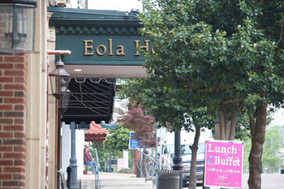 MY AMAZING ADVENTURE IN NATCHEZ: A NORTHERNER’S INTRODUCTION TO SOUTHERN HOSPITALITY Dolly Baruch, April, 2011 On tour in the Deep South, checking out Jewish historical sites, synagogues, museums, civil rights history, and even some plantation mansions, with Rabbi Weiss and 23 members of the Oak Park Temple community, we stopped overnight in Natchez, Mississippi. We stayed at the Eola Hotel, a historic old place that advertises its “exuberant” décor. Antiques from the Victorian period plus a grand hall by an eclectic collection of museum quality antiques, original oil paintings, statuaries, and fountains. 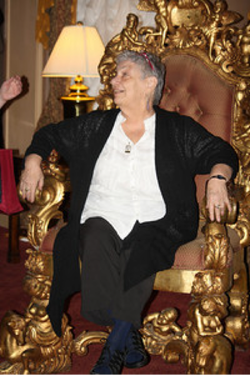 That’s me on the throne in the raised lobby (there’s also a low level lobby as well). As is my wont, while this tour was tremendously interesting, educational, historical, and pleasing, I do like to get off by myself and check out what’s not on the agenda. So after I checked into the Eola and made tentative dinner plans with some friends, I went out to explore where we might have our meal. Two blocks up and down Main Street, there were numerous restaurants and cafes, and Breaud's Seafood & Steak looked promising. I read the menu on the window, they had food I could eat, the smells were great, and prices were reasonable. While I was reading the menu, a waitress came outside and invited me in – I said I was going back to my hotel and would be there later in the evening with some friends for dinner. On the way back to the hotel, I peeked into the Jack + Stella Boutique, a charming children’s clothing store. I shopped a little, but the prices were out of my pocketbook range. Then, as store was about to close, I asked the three women who were chatting just in front of the counter if there was a grocery store nearby that I could walk to so I could pick up some of the food I needed that I knew I probably couldn’t get in a restaurant (fat-free yogurt and fresh fruit) or where I was staying. “No,” they said, “no grocery store nearby to walk to, maybe a couple of miles but it’s too far to walk.” “But no worries,” one woman, a vivacious attractive woman a little younger than I whom I took to be the owner of the shop, “I’m just on my way to the grocery store myself to pick up a few things, and I’d be glad to take you there.” “Oh no,” I protested, “then you’d have to drive me back to the hotel. Or is there a taxi I could take?” “Oh, I’m sorry, I’m not letting you take a taxi. My car is around the corner. I’ll take you there and back. No trouble.” I let myself be persuaded, I really did need the food and there were no other open stores in sight, nor really, any traffic at all. A taxi would be a little much to expect in this small city at this time of the day. “I’m Brenda,” the woman said. “I’ll be back in a minute.” And she was. Brenda said she wanted to stop at the deli and we drove there chatting pleasantly about my tour and my plans for the evening. The deli was like nothing I’d ever seen in the north, really just a few shelves full of delicacies and a prepared food counter and a glass doored refrigerator. They didn’t have any apples, but there was a pint of freshly picked local strawberries – “We just got them from Pascagoula this morning.” I’d not a notion where Pascagoula was, but they were lovely strawberries that I couldn’t pass up (even at $5 a pint and they turned out to be sweet and juicy and just the right amount of firmness – kinda sexy). I asked if they had any fat-free yogurt at the counter where Brenda was buying some good looking freshly prepared dinners, but no, no yogurt at all. “Oh, that’s all right,” Brenda said. “I’ll take you to the Daisy Street Grocery, it’s on my way home.” 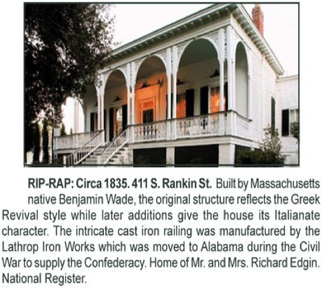 Then I felt really overwhelmed by her generosity and tried to say, no, never mind, I’ll just go back to the hotel, but Brenda was already on her way, parking out front and telling me exactly where I could find the yogurt in the story, “go straight back and turn to the left.” She was waiting for me in the parking lot as I paid for my food. “I’ll just take you on a little tour of Natchez on our way back to the hotel.” As we were driving, she told me she had a book signing coming up and that she had just stopped in the store to drop off some copies of her new book and wasn’t the owner at all. She had written her first children’s book, which was to be the first in a series of stories about her dog Winston and his adventures in Natchez. “That’d be perfect for my grandson. Where could I get one?” I asked. “At any gift shop in Natchez. But they’re all closed now. Mmmm, I have some at home. I’ll drop by there and you can get one.” Protesting all the way, we drove to her home, a beautiful mansion – she stopped here and there to wave to people, to just talk a little, and to introduce me to them. She also introduced me to her neighbors on each side of her home, keeping up a running commentary about each of them, where they’d come from, where they’d been, this one took the photographs of the dogs for her book, that one had a glorious garden. Her husband was home, not feeling well, her house was a mess (not true), her son was out, she’d hated dogs until she found Winston, whom she loved…and on and on, giving me a history of her town. Her home turned out to be on the Natchez Pilgrimage, the Rip Rap House, which reflects the Greek revival style while later additions give the house its Italianate character. We walked up the broad front steps but not before another neighbor dropped by, and we stood on the porch while Brenda introduced me to this neighbor and they conducted whatever business they had. By this time, I was totally overwhelmed, and getting quite anxious as I knew my dinner companions were probably waiting for me, and even though I had my cell phone with me, I’m such a tech dummy I didn’t think to call them to tell them I’d be late. Her house was filled with antiques – beautiful and tasteful (not at all the “exuberant” kind that the Eola Hotel had), and again, I was overwhelmed, this time by the stunning home of a complete stranger who’d done more for me than I’d ever expected. I’d no idea in the world that kind of hospitality existed. And while I’d been a tiny bit suspicious to begin with, thinking this was a little bit much generosity to sell a children’s book, seeing the home with the exquisite antiques led me to understand, this was a true example of southern hospitality. She called her dog in, so it could autograph my book with his paw dipped on an inkpad, and signed it to Bubie Dolly and Django. (http://www.amazon.com/Little-Winston-His-Adventures-Natchez) But not until then was she ready to drive me back to my hotel. She asked who my guide had been for the mansion tour. I retained the guide’s name (quite a feat for my leaky memory), Mary. “Oh Mary So-and-So, she’s a wonderful hostess.” And on the way, we just happened across Mary and her husband on their way out to dinner, so we just had to stop and talk a few minutes with them and see if she remembered me from earlier in the day. She had (or she said she did)! I guess the whole episode took about an hour and a half – and I had just wanted a 15 minute walk to clear my head and find a restaurant and a grocery store. When I got back to the hotel, my dinner companions were awaiting me – I had after all scouted out the restaurants for them, and we surprised the waitress at the Breaud by actually coming back. The waiter was adorable, the food was good, the prices were right, and later that evening, I had my Pascagoula strawberries and fat-free yogurt. An amazing adventure. An experience first hand of southern hospitality. A gift for my grandson Django. And a great story to relate on the long bus ride to the Rabbi and my tour companions the next day. What could be better? 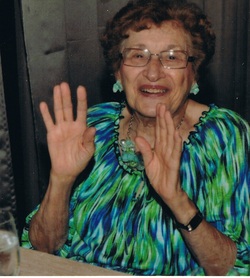 Today I realized I belonged to possibly four groups that read, observe and end up with discussions. I also realized that Torah Study is the best and the one I enjoyed the most. Of course I learn from all of them reading and discussing. But the best part comes later. We all talk about so many things like books, experiences, help with problems and so much more. It is all done by such friendly people and lots of laughs also (and jokes from one certain member). I am so lucky to be part of Torah Study #1 and wanted to express how much I love being with this group at Oak Park Temple. We are here
And we are not here. Multitudes died Multitudes wait to be born; "Now" is elusive. Ephemeral moments Streaking by at quarky speeds Too swift to be perceived. But any moment, even our last moment, Can still be divided infinitely Stopping time. Life swings us back to here and now, As the metronome dances from side to side Effortlessly leaping past the curious, infinite middle point. We don't even think about the wonder. In a photograph taken three years ago You are here, and not here, You're hiding alive in that infinite, quarky instant. Where we remain coexistent. We are here now And we are not here now. We are already dead And waiting to be born. We still take walks In the somewhen. October 14, 2013 Karen Morris Muriello 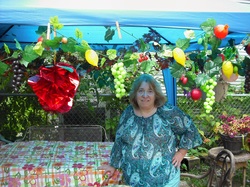 When I joined Oak Park Temple 34 years ago, I never realized how important it would become in my life. At the time I was a single parent of a six year old and I wanted to join a Temple where my daughter and I would feel comfortable and one I could afford. Oak Park Temple welcomed me with open arms. They made joining affordable by allowing me to pay whatever I could afford. This has always been their policy and I have been extremely appreciative of that policy. Their philosophy has enabled Jews of all income brackets to get together and worship, learn, celebrate, socialize, grieve, and comfort each other. For me it has provided an extended family that I can always count on to support me spiritually, physically, and emotionally. Over the years I have been able to become more involved in Temple activities and committees. For about ten years our family belonged to a chavurah with six other families and we celebrated many holidays together as well as family simchas and attended a few shivas. When I had major surgery, the Temple was there to help provide meals for my family and emotional and spiritual support for me. Five of my six children, as well as myself, have celebrated our B’nai Mitzvahs at Oak Park Temple with Rabbi Gary Gerson, whose position as Senior Rabbi started the same time I became a member. Three of my children have attended Beatrice Glasser Preschool. Next summer our eldest son and his fiancée will be married by Rabbi Weiss. I am an active member of Sisterhood and participate in two Torah study groups, one of which is run by our current Senior Rabbi Max Weiss. The second Torah study group has become my chavurah as well, and out of that group I also belong to a book group. Now my family and I celebrate many of the holidays together with members of that Torah study group. In addition to my study groups, I belong to the Adult Education Committee and am the chair of the Worship Committee, which makes me an active board member. I also sing with one of the adult choirs. Every week I attend Sunday minyan at 9am with Cantor Julie and many other congregants. On the fourth Friday of the month I attend the Wine and Cheese social which precedes the 6:30p Shabbat service. I always look forward to celebrating all of the Jewish Holidays at Oak Park Temple. I am comforted by the fact that no matter what happens in my life, my Temple community will be there for me. My friends are mostly Temple members with whom I pray, celebrate, mourn, socialize, study, and debate. Oak Park Temple is not just a building, it is my extended Jewish family and community and without it, my life would be incomplete. 7/25/13 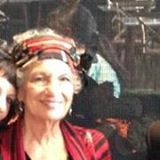 It is 1947. I am eight years old. My father has taken me to Yom Kippur services at a small Orthodox synagogue on the near west side of Peoria. My younger sister and my mother are home preparing the break the fast. But my father has elected to take me to synagogue with him, in my new clothing. It is hot and I am sweating, as are all the men in their best suits and under their tallises, but the outfit my mother has chosen for me to wear is meant for school that will start the next week – so I have on a new wool sweater over a long sleeved blouse, knee socks, a plaid wool skirt, and new saddle shoes. It is quite a privilege to go with my father to shul. I have not been to services with my father since arriving in Peoria earlier that year. In California, we went to services at a Reform temple where everyone sat together. This dilapidated ancient shul has a second floor where the adult women and their children are seated but my mother has refused to attend such a synagogue. She knows something about my father that I found out only that day. He is both proud and profligate. Even if the family does not have a lot of money and every penny has been sunk into a new business, my father will make a Yom Kippur pledge that he will not be able to keep. My mother won’t go to shul with him, half because the women have to sit separately and half because she knows he will be right up among the big machers making a big pledge that will embarrass her. As I am just a child, I am permitted to stand next to my father in his yarmulke and play with the tsit-tsit on his big white tallis.
At home, my mother and father argue about a Yom Kippur pledge. I hear the arguments. But I do not yet know that my father will be competitive with the other businessmen, most of whom are very well established and that he will not honor his promise to my mother to keep his mouth shut. I also do not know that, for the first time I too, influenced by my mother’s heated arguments, will be embarrassed by my father when he shouts out a sum of money he cannot pay when the other men shout out their pledges. I do not know exactly what transpired or how my mother found out about his braggadocio. But I did hear part of the argument when she did discover his largesse – my father was convinced that the other men were bragging too and that their pledges were no more likely to be paid than was his. My mother took the opposite tack – those other businessmen made lowball tenders. They gave lots less than they were capable of according to her. I tend to believe my mother’s acumen in this case. She knew all about men and how they competed in every arena. My father was a sportsman and he was also unrealistic about his prospects. My mother was a pragmatist of the greatest shrewdness. She knew exactly how much money each and every man in the Jewish community was able to give, including her husband. “How,” you may ask, “does this make possible my decision to become a member Oak Park Temple?” If you indeed have been a member of OPT and have gone to High Holiday Services, you will know that it is with the utmost gentility that money is asked for. In fact, some years, the Yom Kippur appeal from the bema seems only to be “kindly read the fund raising letter you received in the mail.” A second reason was that as soon as I entered the rotunda and the sanctuary I found that the congregation was made up of every shade of person – the big machers were in evidence and so were pishers. Variations of race and color were front and center especially among the children, so that I knew that my own halfbreeds would not seem out of place nor would I have to make excuses for them or for their lack of knowledge about Judaism. In fact, one of the first questions I asked Rabbi Gerson (and I attended the first service he ever gave) was whether my children would be welcome, especially since my oldest child would be entering into the Confirmation Class. She had never attended any religious school except for one summer day school session of a Baptist Church which quickly got dumped by a disillusioned kid who thought she was going to play dominoes with her little boy friend but instead was taught a catechism. Rabbi Gerson’s answer to my question about my children’s acceptance? The classic “pintele yid.” He assured me that each of my children had a pintele yid that would make them feel at home. And he was right – my oldest daughter fit right into the class and in fact, I kinda felt like she was a “star” when she was asked to play her flute as a part of her participation in the Confirmation ritual. Other reasons why I felt at home at OPT? As a single parent, I was one among many single parents. As a divorced mother of three, I was one among many divorcees. As a working woman of limited means, I was welcomed nonetheless. I seemed to find community where I never had ventured on my own before – certainly not since I had left home at age 18 had I once been to a Jewish religious service of my own volition. But here in this community I was one among many and that made me not only want to nourish my children in the ancient rituals and learning but also, as I soon found out, my own self needed this nourishment and it was to be found and encouraged at Oak Park Temple. It’s more than 35 years now and I continue to find and build that sense of community and acceptance and ritual and peace and accomplishment that I desired for my children. They themselves may or may not ever choose to find what I have found here but it was a propitious trek from La Grange that, because it was too long a trip to go back home and return again to pick up my children, brought me to choose and to continue to choose Oak Park Temple as my sacred home ground. |
Our StoriesPeople
All
Archives
October 2015
|
 RSS Feed
RSS Feed
